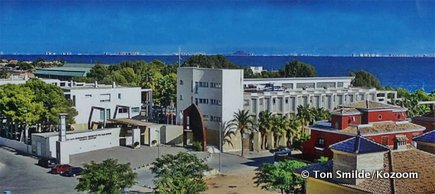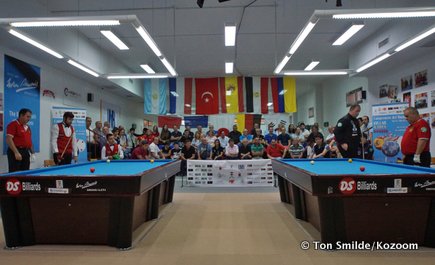NAREJOS - The sports centre, on a 15.000 square meters ground near the sea, was built in 1990 and young Spanish talents can be eductaed there all year round. There, inside, is the arena where the Junior World championship is played these days. The former Spanish top player José Maria Quetglas is the trainer and coach of the young talents. Their stay is subsidized by the government and the department of Murcia. ,,The Spanish federation does not pay for the training of young players, but we develop programs for the young guys to participate in international competitions'', says Fernando Requena (61), who has been a fixture in Spanish billiards as a former chairman and current vice-president of the UMB.
The world championship for under-22 year olds is coming up tot he finals this weekend in the Narejos centre. Three of the Spanish players who train here, are in the field of sixteen. José Maria Quetglas (69), who lives in Murcia, is in charge here. He is the spiritual father of the youngsters, and an inspired coach. ,,This centre is my life's work'', he tells us on a sunny terrace outside the complex, where he joins us with Fernando Requena to discuss the unique Spanish billiard education.
Dani Sánchez, the current world champion, was no longer a junior when this program started, but Javier Palazón, the former triple world junior champion, David Martinez, Juan David Zapata, Antonio Ortiz and Carlos Anguita, the reigning European junior champion, are the best known names to come out of the Spanish school. Fernando Requena: ,,The system has a firm structure. The athletes, not only billiard players but other sports as well, live here all year, they study at one of the nearby universities, eat here, sleep in one of the 150 rooms and follow training sessions.''
The sports centre is fenced off, the athletes (billiard players too) follow strict rules of discipline. They are allowed to leave the complex, but they must be back before 11 in the evening. The athletes come from various disciplines, such as judo, triathlon, wrestling, gymnastics, canoeing, billiards and taekwondo. José Maria Quetglas: ,,As the Spanish billiard federation, we were able to create our ideal here. When the centre opened in 1990, it was just a summer camp for our young players. But since 2005, there is a new system where athletes can be trained as they live here. They follow special programs all year long. The billiard arena has six match tables and two pool tables. I usually teach four hours a day, and in addition to that, the players can practice as often as they want. That is paid for by the ministry of sports.''
The centre is one of a kind, in the world of billiards. Not even the Korean federation, with all its talent, is using this system, and no other major 3-cushion country has a youth centre like this.
Fernando Requena, from Valencia: ,,Thanks to this centre, we have been able to eductae and train many Spanish junior champions. That is the reason I look into the future with confidence. It is my conviction that the new European federation under the leadership of Diane Wild will create new impulses. In the European billiard countries, we must have better structure, better education, to be able to compete with the inflow of Asian talent.''
Jose Maria Quetglas, a past multiple Spanish champion in all disciplines, has his own perception of talent education ,,I've heard the stories about Korean kids who practice 8 or 10 hours a day. That is a lot. I think there should also be time to relax, to hang out with friends. I think 6 hours of practice per day is just about the maximum. I also teach classes in Colombia and Egypt. Those players are also willing to dedicate themselves and make a big effort. Huberney Cataño, a young Colombian, once asked me if he could get ten hours of lessons per day. Not only is that impossible for me, it is not good for him. Two hours of intensive teaching is perfect, and it allows you to digest what you've learned.''
The coach, ever so passionate about his sport, ends the conversation and heads back to the arena of the WC. The tournament has entered the last stages of the qualification. The Spanish results make him happy. Carlos Anguita is second in his group behind Beom-Yeol Lee, and qualifies for the quarterfinals Mario Mercader is second behind Myung-Woo Cho and also qualifies. The Koreans lead the march, the Spanish follow. That is how the world of junior 3-cushion currently looks, because in spite of the education system: there is nobody to follow in the footsteps of Dani Sánchez yet.

The sports centre in Narejos close to the sea

The billiards arena where the Junior World championship is played these days
